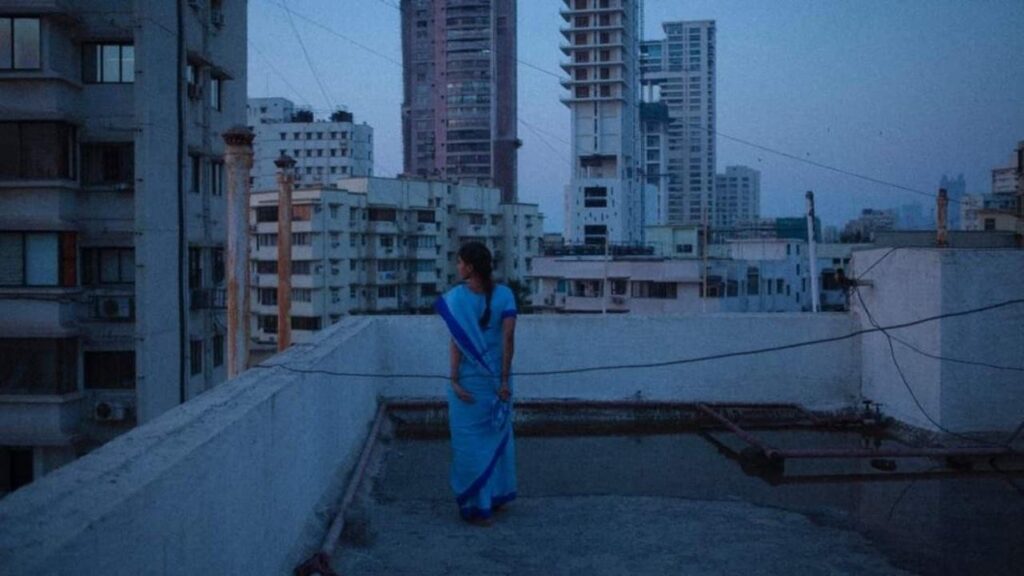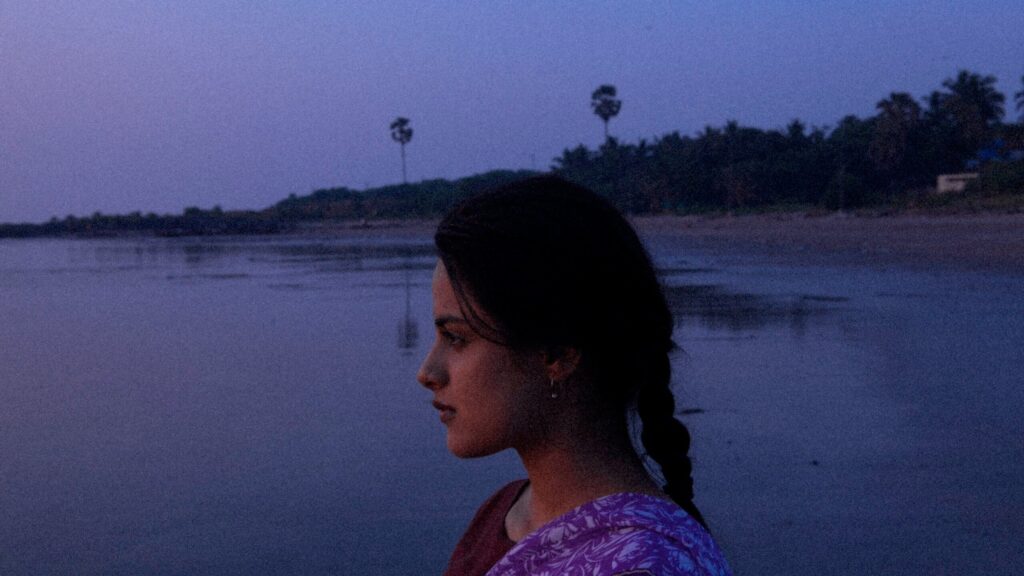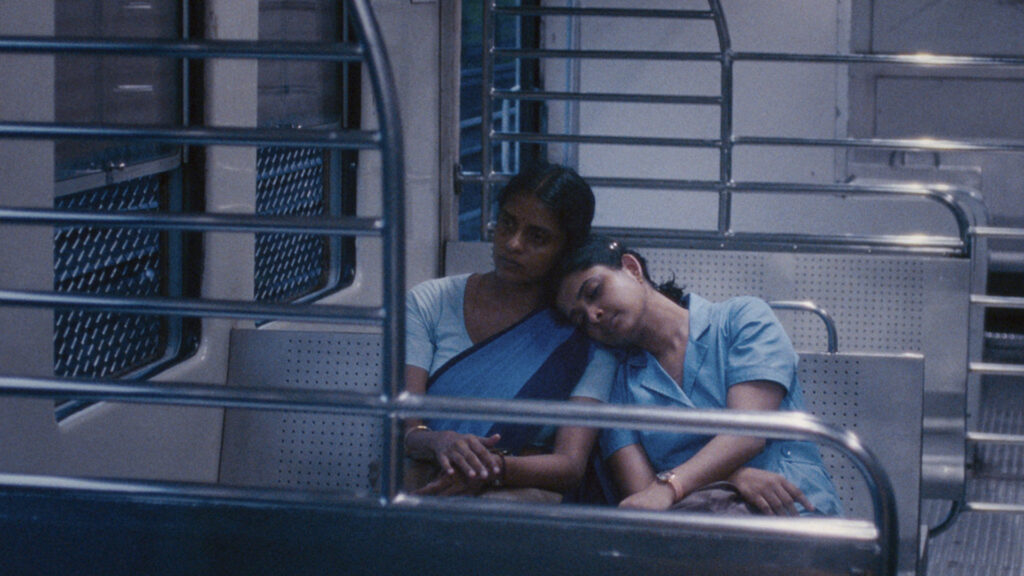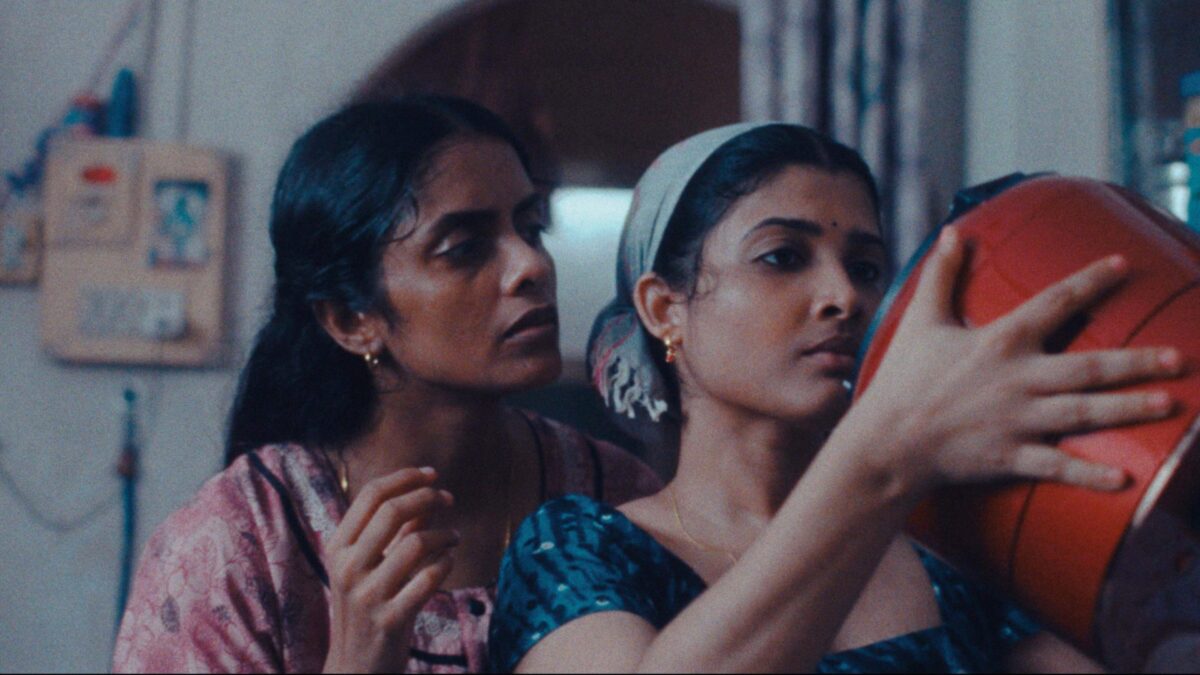Mumbai-core
There’s a scene in All We Imagine as Light that is one of my favorites of the year. Prabha (Kani Kusruti) is a nurse living in Mumbai. When she was a young adult, her parents arranged a marriage for her to a man who has been working in Germany ever since. He never calls or writes. She claims they haven’t even had contact in seven years. He may as well not physically exist, but he casts a large shadow over Prabha’s every day. And then, one day, a sleek, modern, German-made rice cooker arrives in the mail addressed to Prabha. No note or explanation is included, but who else could it be from? God? (Maybe.)
A few nights later, Prabha can’t sleep. Her roommate Anu (Divya Prabha) is out. Prabha is alone. She creeps out of her covers and pulls something out from under her bed. It’s the rice cooker. She’s moved it from the kitchen to her room at some point since receiving it. She stares at it with an expression that is hard to read but clearly lonely and sad. And then she embraces it, wraps her arms and even her legs around it, as if it’s a piece of her broken soul she wants to reabsorb. The rice cooker is a symbol for her absent husband, but it’s so much more than that, too. It’s Prabha’s conservative upbringing clashing with the fast-moving city she lives in; it’s India’s cultural tussle between traditionalism and progress; it’s a provider of warmth and sustenance in a society where women are expected to never ask for and covet such things.
This moment comes about a third of the way into All We Imagine as Light, the Indian and French production of a film spoken mostly in Malayalam, with touches of Hindi. The film received a rapturous response after debuting at Cannes, but was an Oscar snub as neither France nor India opted to submit it for consideration for Best International Film. The film is much more frank and natural than the other recent Indian films I’ve seen, which have all been theatrical spectacles. All We Imagine as Light is much more analogous to coming-of-age, slice-of-life indies that Sundance is known for, complete with the same soft-focus, shallow-lens cinematography the American indie drama scene traffics in.

The film centers on three Indian hospital employees. Prabha and Anu are nurses who live together but with contrasting personalities; Prabha’s buttoned-down demeanor and face-value acceptance of her lot in life clashes with Anu’s vivaciousness and recklessness. Anu is in a relationship with a Muslim man named Shiaz (Hridhu Haroon), a union that both of their families would surely forbid. They spend their nights soaking in urban anonymity, but hungry for some privacy. Prabha, meanwhile, ponders what her future with her absent husband may hold as she draws closer to the friendly doctor Manoj (Azees Nedumangad).
The film’s third major figure is Parvaty, an older woman who works as a cook in the hospital. She bonds with Prabha as tries to battle a hostile takeover of her home by a real estate-gobbling corporation. Partvaty struggles to figure out what comes next for herself, like Prabha and Anu — if and how to fight the loss of her home, and where to go if she fails.
All We Imagine as Light improves steadily across its runtime; or maybe I just locked in with characters who were not familiar to me at the outset. I struggled throughout the film with how much it inevitably becomes a commentary on the cultural repression of the traditions driving its characters’ lives: parents arranging marriages, religions forbidding romance with members of other religions, women faithfully deferring to the men in their lives. Some of the nuance around languages and religious customs and different Indian regions was lost on me, though the general ideas are clear enough.

The production in the city does a great job of capturing the lost-in-a-crowd sensation: On the one hand, overwhelmed and overstimulated by the throngs of humanity always surrounding you; on the other hand, lacking personal space and personal connection, the faces an impersonal blur. And yet, it’s never brutal or alienating; there’s an appealing fuzziness established in the opening montage and maintained for the duration.
Payal Kapadia writes and directs the film, her second outing following the 2021 documentary A Night of Knowing Nothing. Kapadia crafts immersive and sympathetic character portraits for all its characters. There is no villain except perhaps Prabha’s absent husband. Even the doctor who connects with Prabha despite knowing she’s married is a total sweetheart, writing poetry and speaking in gentle tones to match Prabha’s reluctance.
The film’s final act is a sojourn from the city to a rural village which brings all of the characters into sharper relief and to more vibrant life, as if the cloud of Mumbai chaos was a malaise. A climactic romantic encounter and sex scene is surely one of the most intimate moments of cinema in 2024. Kapadia introduces some magical realism into the climax to tremendous effect. I was completely riveted for this closing stretch of the film, and my rating below reflects my affection for the film’s ending.

What most impresses me about Kapadia’s filmmaking is the way she draws parallels between the characters in both subtle and obvious ways. Clever sequencing and editing provide stark ironies and contrasts between Anu and Prabha in particular. My favorite might have been the two ways each interacts with prone, shirtless men in the film’s final act. At first, the encounters appear to be opposite — love vs. death — yet they converge into a mirrored, bittersweet blend of affection and regret.
All We Imagine as Light’s very last beat is less ambivalent and more forceful than I expected from the movie leading up to it. It’s not quite a movie-jarring blast of yass-queen feminism as seen in final scene of The Royal Hotel, but it still made me question if I was over-projecting subtlety into Kapadia’s messaging. From these closing moments, she’s pretty clearly progressive in her mindset, angrier at the regressive social structures that control her characters’ lives than she let on in the opening 90 minutes. But it’s still a powerful conclusion that caps off one of 2024’s most lovely slice-of-life films.
Is It Good?
Very Good (6/8)
Dan is the founder and head critic of The Goods. Follow Dan on Letterboxd. Join the Discord for updates and discussion.

